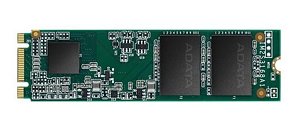
ADATA Upgrades Endurance Rating of Its Industrial-Grade 3D TLC SSDs
ADATA Technology (Taiwan Stock Exchange: 3260.TWO), a leading manufacturer of high-performance DRAM modules, NAND Flash products, and mobile accessories announces that it has upgraded the endurance rating of its industrial-grade 3D TLC solid state drives (SSD) to 3K P/E cycles, bringing their endurance, reliability, and stability up to par with 2D MLC SSDs. Combined with their ability to operate in a wide range of temperatures (-40° C to 85° C), they are excellent solutions that provide the durability and consistency required by applications such as Artificial Intelligence, Internet of Things (IoT), Intelligent Transportation Systems, surveillance systems, data centers, network operations, defense systems, and energy exploration.
The continual improvements in NAND Flash design and manufacturing, as well as the ever-changing demands of the market, have driven 3D NAND to become a popular memory solution across many industries. Despite its growing prominence, 3D NAND has had two major deficiencies, namely the ability to operate in extreme temperatures and achieve higher endurance ratings. To fill this gap, ADATA has upgraded its industrial-grade 3D TLC SSDs to an endurance rating of 3K P/E cycles, which makes them comparable to 2D MLC SSDs. At the same, ADATA 3D TLC SSDs are also designed to operate in a wide temperature range (-40° C to 85° C), delivering a memory solution that is long-lasting, robust, and reliable.
The continual improvements in NAND Flash design and manufacturing, as well as the ever-changing demands of the market, have driven 3D NAND to become a popular memory solution across many industries. Despite its growing prominence, 3D NAND has had two major deficiencies, namely the ability to operate in extreme temperatures and achieve higher endurance ratings. To fill this gap, ADATA has upgraded its industrial-grade 3D TLC SSDs to an endurance rating of 3K P/E cycles, which makes them comparable to 2D MLC SSDs. At the same, ADATA 3D TLC SSDs are also designed to operate in a wide temperature range (-40° C to 85° C), delivering a memory solution that is long-lasting, robust, and reliable.


